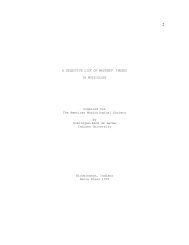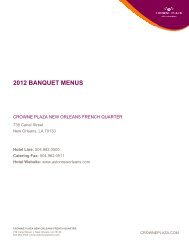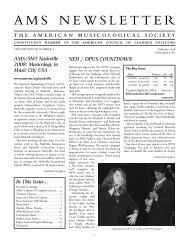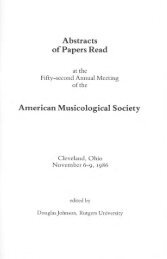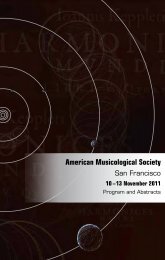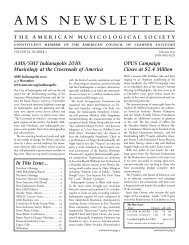Abstracts - American Musicological Society
Abstracts - American Musicological Society
Abstracts - American Musicological Society
Create successful ePaper yourself
Turn your PDF publications into a flip-book with our unique Google optimized e-Paper software.
10 Thursday Morning: Session 1- 9<br />
AMS/SEM/SMT New Orleans 2012<br />
songs of new and old. For most Birifor xylophonists this role leads to rampant jealousy within a local culture of competition<br />
and suspicion, making them targets for malicious gossip and witchcraft (suoba). However, for Birifor xylophonists with<br />
blindness, a physical condition with a longstanding history in the region, the perception of their minds, bodies, and music<br />
through a preexisting cultural ideology of ability leads to a compound form of subordination that relegates their very being<br />
to witchcraft. While the social and physical models of disability recognized in recent Western scholarship persist in Birifor<br />
culture, they are encapsulated within a previously untheorized spiritual model of disability that labels the disabled body as the<br />
result of corrupting mystical forces. Confronting this compound subordination of musicianship and disability, blind Birifor<br />
xylophonists identify, critique, and contest the locations of disability by composing and performing “enemy music” (dondomo<br />
yiel). Examining select compositions by blind Birifor xylophonists, this presentation references fieldwork recordings and song<br />
texts to amplify the unsung perspectives of musicians with blindness, while exploring the broader implications of the culturespecific<br />
aspects of ableism for music scholarship.<br />
Staff Benda Bilili and the Need to Overcome the Ableist Trope of “Overcoming Disability”<br />
Elyse Marrero (Florida State University)<br />
Staff Benda Bilili is a Congolese rock band from the streets of Kinshasa, in the Democratic Republic of Congo. The band<br />
is backed by former street kids, with the core members consisting of older musicians who have physical disabilities due to<br />
contracting polio during childhood. These older musicians were ostracized by non-disabled musicians in Kinshasa leading to<br />
the formation of Staff Benda Bilili. During my research of this band, I noticed the ignorant and problematic ways journalists<br />
describe Staff Benda Bilili, which include the lack of disability language etiquette, and the use of a common and irritating<br />
trope in describing successful persons with a disability: the trope of “overcoming disability.” By referencing recent scholarship<br />
on Beethoven and deafness, through my analysis of the music video and lyrics of Staff Benda Bilili’s song “Polio,” and my<br />
critical take on a BBC article and video report about Staff Benda Bilili, I argue that this band has claimed their identity of<br />
disability. I also argue that the trope of “overcoming disability” is not only offensive but also discredits the musicianship of<br />
Staff Benda Bilili, and ignores the musical and non-musical accommodations these musicians have created for themselves. The<br />
paper calls for overcoming the use of the trope of “overcoming disability” and to change the typical ways ethnomusicologists<br />
describe musicians with disabilities. This discriminative language is what disables musicians with disabilities—not the actual<br />
physical, emotional, or cognitive difference labeled “disability”—and disables musical scholarship that focuses on deficit<br />
rather than difference.<br />
Session 1-9 (SEM), 8:30–10:30<br />
Revival and Renewal<br />
Riccardo Trimillos (University of Hawai‘i), Chair<br />
“We Had Great Books, but No Music”: Iceland, with and without Music<br />
Kimberly Cannady (University of Washington)<br />
A foundational myth in Icelandic cultural history is an imagined “absence” of music prior to the introduction of symphonic<br />
music in the early 1900s. Despite evidence of diverse forms of musical expression in Iceland prior to the twentieth century,<br />
this non-presence is claimed in most European scholarly texts, and was also repeated by Icelanders themselves during my<br />
fieldwork. The persistent idea of the “music-less nation” has been offered as an explanation for the perceived development of<br />
a unique Icelandic Sound in contemporary popular music, and the growing international success of such music. Strikingly,<br />
at the same time, aspects of pre-twentieth century Icelandic music, such as rímur and the langspil increasingly appear in the<br />
very same music. This contradiction reveals the role of musical heritage, both real and imagined, throughout Iceland’s long<br />
nation-building project beginning in the nineteenth century. While Iceland’s cultural reputation was built on its adored literary<br />
and linguistic history, its musical history was encouraged to be forgotten in favor of continental musical trends. This paper<br />
explores the political and historical reasons for the stripping of musical history from the mid-nineteenth century up until the<br />
late twentieth century, and examines the context for a renewed interest in the abandoned musical styles. My research is based<br />
on two years of fieldwork in Denmark and Iceland, and is informed by musicologist Árni Heimir Ingólfsson’s work regarding<br />
Icelandic musical history, Philip Bohlman’s research on music and European nationalism, and anthropologist Kristín Loftsdóttir’s<br />
work on Icelandic national identity.



